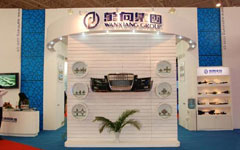Lingyun reaps rewards from German acquisition
By Qiu Bo (China Daily) Updated: 2014-06-14 07:25German car-parts maker Kiekert AG has emerged as one of the crown jewels in overseas acquisitions by Chinese companies after reporting solid growth and continuous profitability for two years in a row, a top company official said on Friday.
Kiekert, owned by Chinese car parts maker Lingyun Industrial Group, which makes latch systems for passenger cars, is already a global market leader in its segment, said Li Xizeng, chairman of the Lingyun group.
 |
Market share has also risen in the two years since Kiekert was taken over by the Chinese company, he said. "Kiekert has a 19 percent share in the global automotive latches market."
According to the chairman, the Kiekert experiment is not just a successful overseas acquisition, but more of a blueprint that Chinese companies can use in overseas markets for sustained growth.
"We have been able to deflect criticism and show how going global can help bring dividends, "Li said.
"Being an auto parts supplier, Lingyun had always harbored dreams of going global. With Kiekert we have been able to make our dream a reality and an integral growth strategy for the group."
According to Li, nearly 70 percent of the overseas deals made by Chinese companies fail due to various reasons." Most of the deals fail due to differences in management styles and practices.
The mismatch also leads to companies being unable to keep pace with market development and being unable to alter strategies. Cultural differences also have an impact on the success and failure of such deals."
Citing the Kiekert example, Li said that when the Chinese company completed its takeover it faced the same constraints. "We had to grapple with issues like employee exodus, brain drain and client losses, issues that could have made the difference between success or failure," Li said.
- Realty data shares hit rough patch amid sales downturn
- Celebrating World Cup
- CSRC to unifiy rules for asset management
- Fonterra plans dairy farm hubs
- Domestic box office spending set to swell
- Firms vying for LED market
- Chinese firms have high compliance risks: E&Y
- Top 10 most competitive cities for mobile Internet


















